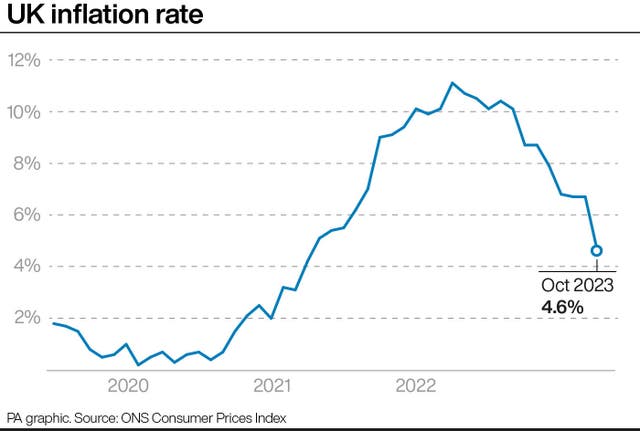
Rishi Sunak is expected to use a speech to paint a more positive picture of the economy ahead of the autumn statement, which Jeremy Hunt has signalled could be used to cut taxes for businesses.
The Prime Minister will hail having last week hit his pledge of halving inflation as he gives an update on the state of the nation’s finances in London on Monday morning.
Mr Hunt, the Chancellor, heightened expectations that businesses could find some relief in his financial statement on Wednesday as he said now is the time to boost growth.But he persistently warned against changes that could fuel inflation, dampening speculation that the pressure of income tax could be eased.
Mr Hunt suggested during a round of interviews on Sunday that the personal tax burden will not come down “overnight” as he seeks to avoid prices spiralling again.
The Chancellor made clear to Times Radio that his “priority is backing British business” and changes that “unlock growth”.
Pressed if income tax could be eased, he stressed the need to act “in a responsible way”.
READ MORE: Shona Robison urges Jeremy Hunt not to cut taxes
“I want to show people there’s a path to lower taxes. But we also want to be honest with people, this is not going to happen overnight,” he said. “It requires enormous discipline year in, year out.”
Mr Hunt said he will not take any actions that would “jeopardise” the fight against inflation, which is higher than wanted at 4.6%, though it has halved in the last year.
“The one thing we won’t do is any kind of tax cut that fuels inflation. We’ve done all this hard work, we’re not going to throw that away,” he told Sky News.
Rachel Reeves, his Labour shadow, warned that cutting inheritance tax during a cost-of-living crisis would be wrong amid some Tory unease over the possible move.
While it would be popular with the Conservative right who have been clamouring for tax cuts, other Tories warned it is not the right time to give a handout for the wealthy.
Ms Reeves told the BBC’s Sunday With Laura Kuenssberg programme: “Cutting inheritance tax in the middle of a massive cost-of-living crisis and when public services are on their knees is not the right priority.
 Rachel Reeves (James Manning/PA)
Rachel Reeves (James Manning/PA)
“I understand people’s desire to pass on to their children what they have worked hard for, but right now that is not the right thing to do and we would not support it.”
She also rejected Mr Hunt’s argument that he needs to take “difficult decisions” on welfare payments.
Typically, ministers use the September figure for inflation when uprating working-age benefits, which would mean a 6.7% hike.
However, the Chancellor has been considering using October’s far lower figure of 4.6%, which economists say would cut spending by around £3 billion.
The savings would largely affect working-age households receiving disability or means-tested benefits, according to the Institute for Fiscal Studies (IFS).
 (PA Graphics)
(PA Graphics)
Only about 4% of deaths in 2020/21 resulted in inheritance tax being paid, with exemptions allowing many couples to pass on up to £1 million tax-free.
Inheritance tax is charged at 40% on estates of more than £325,000, with an extra £175,000 towards a main residence passed to direct descendants.
READ MORE: Hunt's Cameron gaffe pounced on by BBC's Kuenssberg
Abolishing it entirely could cost £7 billion a year in the short term, but the IFS forecast this could rise to more than £15 billion by 2033.
Meanwhile, a leaked recording obtained by the Telegraph showed Paymaster General John Glen questioning universal winter fuel payments to wealthy pensioners.
Mr Glen, then the chief secretary to the Treasury, asked at a Cambridge University Conservatives event last month whether the triple lock on pensions was “sustainable”.
The Treasury ruled out a change to the winter fuel allowance in the autumn statement, with a spokesman saying: “This is not something we are going to do.”



Why are you making commenting on The Herald only available to subscribers?
It should have been a safe space for informed debate, somewhere for readers to discuss issues around the biggest stories of the day, but all too often the below the line comments on most websites have become bogged down by off-topic discussions and abuse.
heraldscotland.com is tackling this problem by allowing only subscribers to comment.
We are doing this to improve the experience for our loyal readers and we believe it will reduce the ability of trolls and troublemakers, who occasionally find their way onto our site, to abuse our journalists and readers. We also hope it will help the comments section fulfil its promise as a part of Scotland's conversation with itself.
We are lucky at The Herald. We are read by an informed, educated readership who can add their knowledge and insights to our stories.
That is invaluable.
We are making the subscriber-only change to support our valued readers, who tell us they don't want the site cluttered up with irrelevant comments, untruths and abuse.
In the past, the journalist’s job was to collect and distribute information to the audience. Technology means that readers can shape a discussion. We look forward to hearing from you on heraldscotland.com
Comments & Moderation
Readers’ comments: You are personally liable for the content of any comments you upload to this website, so please act responsibly. We do not pre-moderate or monitor readers’ comments appearing on our websites, but we do post-moderate in response to complaints we receive or otherwise when a potential problem comes to our attention. You can make a complaint by using the ‘report this post’ link . We may then apply our discretion under the user terms to amend or delete comments.
Post moderation is undertaken full-time 9am-6pm on weekdays, and on a part-time basis outwith those hours.
Read the rules hereLast Updated:
Report this comment Cancel